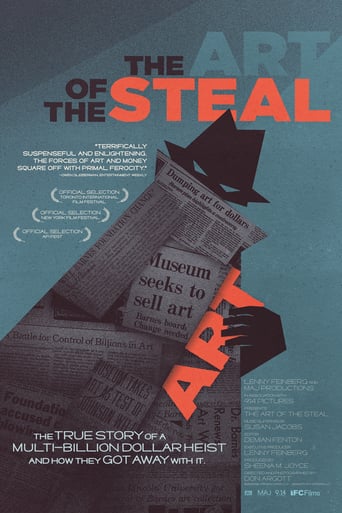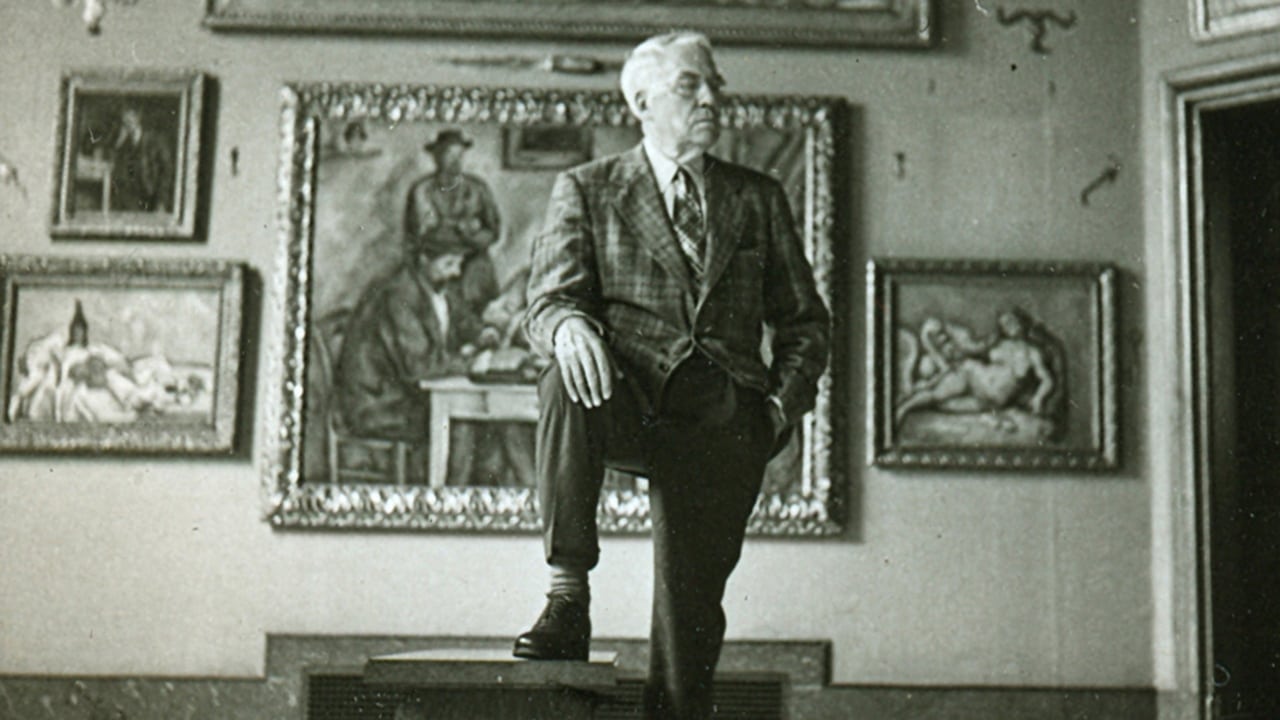penberthyp
In the eleventh hour Merion township forgets it's gripes about bus traffic and realizes it might lose something valuable. After forbidding the Museum to build a 56 car parking lot in a very petty fashion the neighbors of the foundation are portrayed as victims of the move at the end of the movie. I'm sorry. Glanton may be a clod, but he was forestalling what turned out to be the inevitable move of the collection to Philadelphia. Would you rather have the art tour the world temporarily or have it moved permanently to Philadelphia? When you don't bend you break. This is a very sad loss, but I can't help feel that there is no righteous side in this saga. Poor Merion? You mismanaged your asset, ditto Lincoln University. It's sad that there was no brilliant person to manage the estate and oversee it's protection. Incompetence loses to a powerful people with tourist dollars in their eyes.
new859
This movie is full of bullshit. But it's thought provoking, not about the art, but about something else.Is honoring one's will so important? If he wants to burn all these paintings, shall we honor it? Albert Burnes used "education" as excuse to keep these painting private. What's so bad to show it to public? Why show it to small group of people better than show to public? Albert Burnes's will is a WEIRED will. But showing those paintings to more people, justice and fairness have been done. Let analysis from beginning. ALbert Burnes got his money by some kind of luck. He enjoyed his money in his life time by collecting valuable arts to his own home and keep public out. It's already a selfish life. He want to keep the privilege forever by keep those painting to his house forever. What a selfish wish! Education? Go to hell. Showing to public is bigger education.Moving famous painting from a small place to a bigger museum is not a crime. Those people keep on saying this is a biggest crime in art world. Are they out of their mind? The paintings were not damaged, not owned by another selfish people, but to show to the public, owned by government. The angry and hard words from those interviewees in the movie are clueless.I have not idea about this subject before. Totally neutral. And I get the opposite impression against movie maker's intention after wathcing this biased movie. That's how bizzar their logic is! Another point. The crazy art world. Why these paintings so expensive? It's an illusion those "educated" people produce to make money, to show their higher status. It's just a painting. A copy of it has same color and shape, which you can get some enjoyment. The thrill comes from the "ownership of the original". A boost to ego. If those paintings can really enhance one's spirit, why most of the people in this movie are so low? They have closest contact with these best arts.
John Gilpatrick (jlg310)
The Art of the Steal—another great doc in what's already being dubbed the best documentary year in a long time—does something seemingly impossible. It crafts a compelling and informative story about art galleries. It sounds as dry as the Sahara on paper, but the story is surprisingly engaging. I objected to director Don Argott's almost completely one-sided approach to the material, but as long as you keep that in mind throughout, this can be a truly rewarding experience.The film centers around Dr. Albert C. Barnes, a wealthy, anti-establishment suburban Philadelphia native who, in the first half of the 20th century, amassed one of the most impressive and expensive private art collections in history. The Barnes Collection consists of 181 Renoirs, 69 Cezannes, 59 Matisses, 46 Picassos, 16 Modiglianis and seven van Goghs, among other pieces of work, and it resided in Merion, PA, just outside of Philadelphia. When he died, an epic struggle for power and control broke out which has yet to be completely settled. If anything, it has escalated since Barnes' death.Barnes despised the rich, famous, and powerful of Philadelphia. His number one enemy was Walter Annenberg, who operated the Philadelphia Inquirer. And Barnes made his collection incredibly exclusive as a result. As one commenter stated, Barnes denied access to the New York Times art critic, but he'd let the town plumber come in any time of day. After Barnes suddenly died in a car crash, the vultures began to circle, but his will outlined very specific instruction on what should happen to his art. Control over the art passed down to a number of his "disciples," and it was made clear that the art wouldn't be moved.After the last of the disciples died, control went to Lincoln University, a small black college. Their presidents slowly shifted away from Barnes' wishes over time. One president, Richard H. Glanton, took the art on tour and attempted to expand hours to make the art more accessible. Glanton was despised by those loyal to Barnes (many of whom are the primary interview subjects in the film), but he was small potatoes to what the politicians and non-profit organizations did next.The story has the capability to frustrate you. Going against a man's will seems like a really despicable thing to do. But when you sit back and think about what's actually happening, some interesting questions are raised. What's really best: to keep this priceless art hidden at the request of a somewhat bitter man who died more than 60 years ago, or to open it up to the public and let everyone learn and appreciate the incredible work on display? This might be an instance in which what's best and what's right are in opposition, but the film raises the questions. Unfortunately, it doesn't take the time to explore them.The film is incredibly one-sided, more so than any documentary, outside the Michael Moore catalog, that I've seen in a long time. The only person interviewed that isn't a Barnes disciple is Glanton, and it appears he's only on hand because he wants to prove he wasn't as bad as what came after him.This year is already being talked up as one of the best in a long time for documentaries. Joan Rivers: A Piece of Work was one of my favorite films from the first part of the year. Inside Job and Countdown to Zero received very positive buzz out of Cannes. And Exit Through the Gift Shop and Restrepo, among others, have already opened to rave reviews. And that's not even discussing what's coming later this year. I've never been a huge fan of documentaries. Perhaps that's because I was a student and didn't care to sit through a lecture, no matter how interesting the subject might have been. This year, that has definitely changed.
sunshinedaydreamz
This is one of the greatest cultural tragedies of the 21st century, with byproducts that will have a profound impact for decades. This is exactly what is wrong with the world. Barnes stood for so much more than the almighty dollar, and he was one of the richest. It is a shame that politicians are set to ruin an amazing piece of cultural history. Shame on you judge ott, u were bought. And shame on the mayor of Philly and all his paid off cronies. Thanx to the director for standing up for the little guy and making this amazing film to bring light to this injustice, maybe it could make a difference. Nothing is set in stone until it is. What can I do is the question?



 AD
AD
